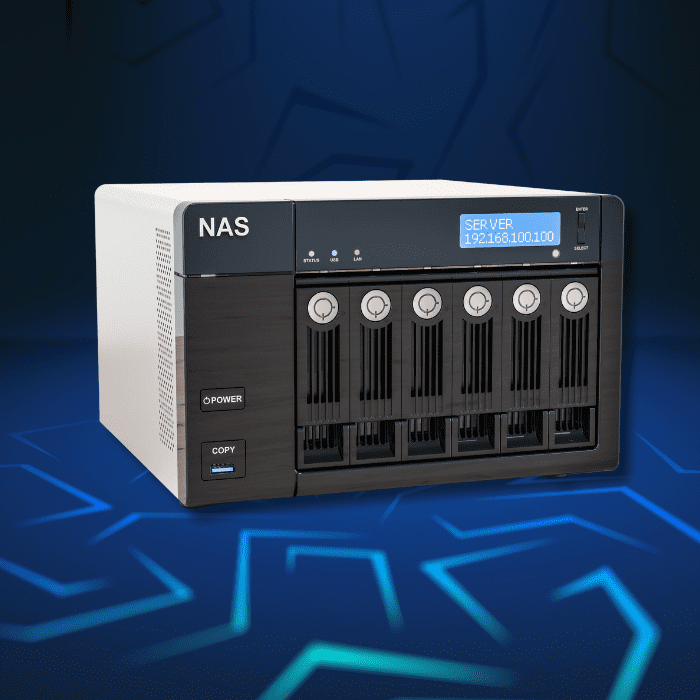Maybe you want to open files on your computer and you can’t, can you? Or maybe you’ve received a system warning that your hard disk is corrupted? Or you even hear strange sounds when you try to access a folder…
This is all a sign that you have a faulty hard disk. When this happens, all or part of the files become inaccessible. But we usually have important files on our hard disk that we don’t want to lose…
In this article, you’ll see how to identify a faulty hard disk to avoid data loss and how to prevent computer hard disk defects. Follow along!
Hard disk problems: how to identify them?
When you’re sick, your body gives you signs – fever and cough, for example – that something is wrong, doesn’t it? The same is true of your hard disk, which shows some common symptoms when something isn’t right.
These are some of the signs you can spot to identify a faulty hard disk:
The computer slows down or crashes frequently
If, while using your computer or trying to access files and folders, it starts to slow down or crash, it could be a sign that your hard disk has a problem. This is one of the first signs that your computer usually shows.
The files don’t open
As well as slowing down and crashing, the computer also has trouble opening files when the hard disk is faulty or has bad sectors. The system may display an error message when trying to open them.
The computer displays a blue screen
The Windows blue screen is another common symptom of a faulty hard disk. If it appears when you turn on your computer or when it’s in use, often after it slows down or crashes, you might want to check what’s wrong with your hard disk.
Data is being corrupted
In some cases, when you try to access files and folders, the Windows system warns you that the data on your hard disk is corrupt. This may indicate that there are bad sectors, due to some physical defect, software problem or malware attack that corrupts the data.
The computer makes strange noises and sounds
Strange noises and sounds can also tell you that your hard disk is faulty. This usually happens when there is a physical defect, such as parts breaking or misalignment.
Hard disks work mechanically and basically consist of a needle that reads and writes data to a hard disk that rotates at high speed. Therefore, a sudden impact or fall can damage the internal parts and impair their functioning.
Windows doesn’t recognize the hard drive
Hard drives with problems may also not be recognized by Windows. Turn on the computer or connect the external disk, and the system doesn’t display the storage drive in File Explorer or Hard Disk Manager.
In some cases, this has other causes, such as defects in the cable or USB port (in the case of external disks) or the connection to the motherboard. In this case, it’s worth testing the hard disk on another computer. But it’s often a symptom of a hard disk problem.
Diagnostic tool reports a problem
You can also use diagnostic tools to identify a problem hard disk. CrystalDiskInfo and Hard Disk Sentinel are some of these software, which check the integrity of the disk and alert you to any errors found.
You can also use data recovery tools such as EaseUS and Recoverit, which scan the hard disk for errors and can repair some problems. But be careful when performing these operations so as not to put your data at risk.
What is the lifespan of a hard disk?
The lifespan of a hard disk is around 5 to 10 years. But this time can vary greatly, depending on the brand and quality of the product and the conditions of use and maintenance of the equipment by the user.
A study by Backblaze showed that 80% of the hard disks they used reached 4 years of operation, with at least 50% probably reaching 6 years.
The symptoms of a faulty disk, which we presented earlier, can become more common when the disk is nearing its final days.
So when your hard disk is getting old, make sure you keep an up-to-date backup of your files, either on another device or in the cloud. This way, if the disk has problems, you can guarantee the safety of your data.
What happens when the hard disk stops working?
Let’s say you have noticed some of the symptoms above, made a diagnosis and come to the conclusion: your hard disk has a problem.
When this happens, you lose access to the files that were stored on it. But this doesn’t mean that the data is definitely lost, okay? In over 95% of cases, Bot is able to recover data from faulty hard disks.
So when you realize there’s a problem, it’s important to stop using the hard drive and look for a solution, so that you have a better chance of recovering your data.
Is it possible to recover a defective hard disk?
It is possible to recover a faulty hard disk, yes. But it’s important to correctly diagnose the causes of the problem in order to find the right solution. It could be a software error, a virus attack, an electronic problem or physical damage.
It is often possible to fix a faulty hard disk and regain access to files using Windows’ own tools or data recovery software.
In Windows, you can run Error Check (in the properties of the hard disk drive) or use the ChkDsk command (in Command Prompt). Data recovery tools are another option: they scan the hard disk for defects in order to correct them and recover the files.
In this case, it’s important to be careful with the procedures so as not to carry out improper actions, which would make data recovery impossible. In order not to take any risks, the ideal is to rely on a specialized company like Bot, with professionals, equipment and environments that are qualified to recover data and devices safely.
Futhermore, when a hard disk has a physical problem, it’s necessary to perform an intervention on the device to allow it to be read. But don’t do this at home, as there’s a good chance you’ll make a mistake or contaminate the internal platters. For this, it is essential to rely on a company that understands the subject.
Hard disk problems: how to avoid them?
Hard disks are very safe and robust devices, but they are subject to failure, especially when they are close to their useful life or when care is not taken when using them.
As the hard disk works mechanically, a fall or sudden impact can damage the parts. In addition, this device has electronic components, which can also be damaged by humidity, dirt or high temperatures.
Therefore, to ensure greater durability, it is important to adopt some preventative measures, such as:
- Use the computer or laptop on a fixed, stable base to prevent it from falling;
- Only transport the laptop when it is switched off;
- Do not expose the hard disk to high temperatures, which can lead to overheating, or to excessive humidity, which can rust parts and burn electronic components;
- Keep the computer, laptop or external disk clean, free of dirt which can damage the device’s cooling and burn out electronic circuits;
- Use an up-to-date antivirus program to protect the hard drive from attacks and, in the case of external drives, only connect them to trusted computers;
- Turn the computer on and off using the Windows function and, in the case of external disks, eject the device before disconnecting it, so as not to corrupt files;
In addition to these tips, it is worth noting: don’t open your hard disk at home to try to solve the problem. Without a controlled environment, it is inevitable that particles will enter the device and affect its functioning, often irreversibly.
How much does it cost to repair a hard disk?
Repairing a hard disk depends on professional work. You need to rely on a specialized company to ensure greater security and success in recovering the data and the device.
To set a price, the company must make a precise diagnosis, based on an assessment of these points:
- The electronic and mechanical structure of the hard disk;
- The damage caused to its structure;
- The possibilities of recovering the data;
- The details of the service.
Prices can vary greatly depending on the condition of the hard disk, but you can expect them to start at around €200. Also check if the company will give you a free quote and if there are any costs for sending the hard disk for evaluation.
How Bot can help you recover your hard disk
Bot is a leader in data recovery. We have been operating in the market for over 10 years and serve people and companies all over the country, with laboratories in dozens of cities, as well as service centers in Portugal.
Our company has experienced professionals and a specialized structure, with internationally certified equipment and sanitized and controlled environments. We achieve success rates that data recovery software cannot – and we do it safely, without putting your files at risk.
So Bot can help you recover your hard disk. We provide free estimates, and you can request collection of your device from any address in Portugal. Fill in the form and start your hard disk recovery with us!



